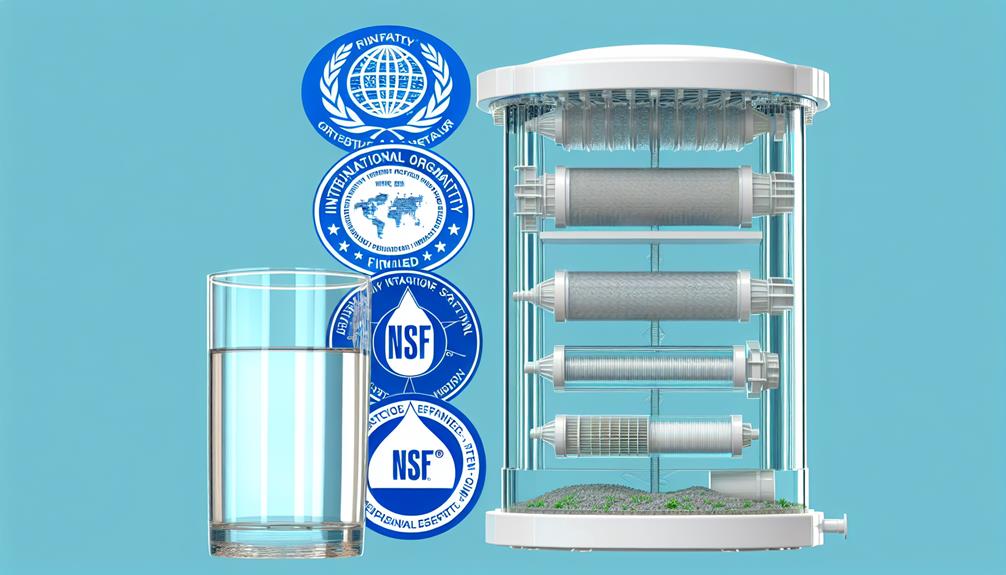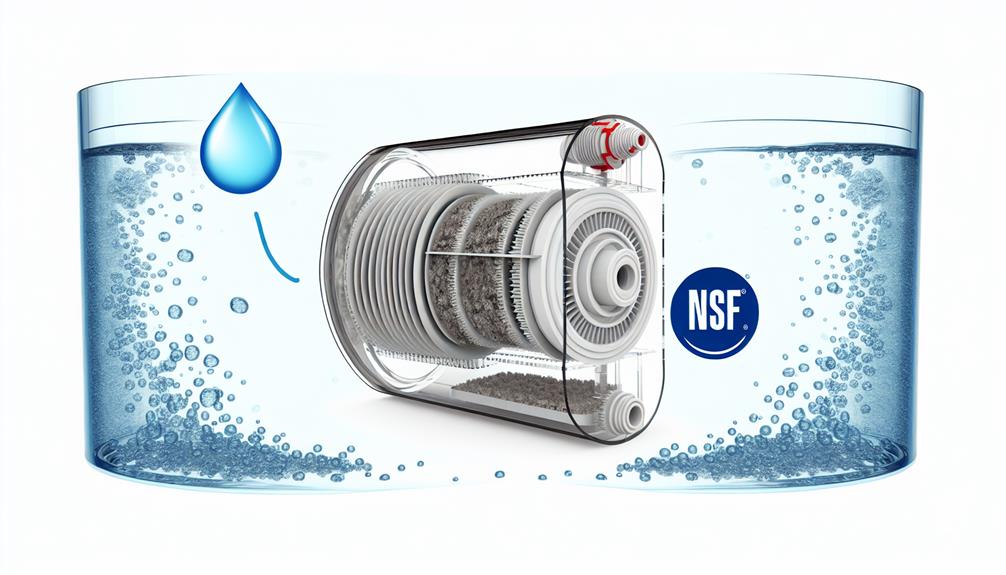Just as the Good Housekeeping Seal of Approval has long been a beacon of consumer trust for various products, so too is the NSF certification mark a sign of reliability and safety for water filters.
You might already know that clean drinking water is crucial for your health, but you may not be familiar with the rigorous standards that govern the filtration devices you rely on. The NSF water filter certification standards are designed to assure that your water filter performs effectively, reducing specified contaminants and ensuring that the water you drink is safe. These standards, developed by the National Sanitation Foundation (NSF), are the result of extensive product testing and material analysis.
Now, you're probably wondering how these certifications affect the choices you make and what exactly they entail for the quality of your water. To fully grasp the implications for your daily life, let's explore the depths of what these standards mean for the water flowing from your tap.
Understanding NSF Certification
NSF certification provides assurance that a water treatment product meets strict standards for public health protection by rigorously testing for effective contaminant reduction and material safety. When you consider a water filter for your home, an NSF-certified filter ensures that it has undergone extensive evaluation against established criteria. This certification process analyzes various aspects of drinking water treatment, including the performance of the product in reducing specific contaminants that may be present in your water supply.
NSF Drinking Water standards, such as NSF/ANSI 53, are particularly stringent, focusing on health-related contaminants. To be certified under this standard, a filter must demonstrate proficiency in reducing substances that could adversely affect public health and safety. The NSF certification mark on a water filter communicates that the product complies with all of the relevant requirements and is routinely verified through product testing and facility inspections.
Certified drinking water treatment units must consistently meet or exceed these standards to maintain their certified status. This includes rigorous testing for the reduction of contaminants identified by regulatory agencies like Health Canada and the EPA. A water filter that's NSF certified gives you the confidence that you're using a product dedicated to safety and quality, reflecting a commitment to public health standards.
NSF Certification Processes
Having understood the importance of NSF certification for your water filter's assurance of safety and quality, let's explore the meticulous processes involved in obtaining this certification.
NSF certification for drinking water filters isn't just a badge; it's a commitment to health and safety. Here are the steps manufacturers go through:
Firstly, a water filter must be rigorously tested to NSF Standards. These standards are designed to ensure that the filter can effectively reduce specific contaminants. For example, if a filter claims to reduce lead, it must meet the NSF/ANSI 53 standard, which is specific for health-related contaminants.
- NSF/ANSI 42: Your filter is challenged against aesthetic concerns like chlorine taste and odor.
- NSF/ANSI 53 Total PFAS**: It's tested for a multitude of health-related contaminants, including emerging concerns like PFAS.
- Product Testing and Certification**: This isn't just a one-time test but a continuous commitment to compliance and quality.
Once the product testing confirms that the filter performs according to its specific contaminant reduction claims, it can be granted NSF certifications. Manufacturers undergo regular unannounced facility audits and product retesting to maintain their certification status. This is a rigorous procedure to ensure that what reaches you, the consumer, is nothing short of excellence in water filtration.
Key NSF/ANSI Standards
Several key NSF/ANSI standards exist to ensure your water treatment systems meet the rigorous safety and performance criteria necessary for effective operation.
NSF/ANSI 42 and 53 target aesthetic concerns, such as chlorine, taste, and odor, through adsorption and filtration, like carbon filters. These standards apply to both point-of-use and point-of-entry systems, ensuring reduction of non-health-related impurities.
NSF/ANSI 44 specifically addresses water softeners that employ cation exchange resin. Such systems mitigate hardness by swapping calcium and magnesium ions with sodium or potassium ions, directly impacting the material safety and structural integrity of your water supply.
For microbial purity, NSF/ANSI 55 certifies ultraviolet treatment systems. Class A units are designated for water suspected of contamination, while Class B systems manage non-disease causing bacteria in already disinfected drinking water, aligning with the Drinking Water Act (SDWA) guidelines.
NSF/ANSI 58, crucial for reverse osmosis systems, governs systems using pressure and semi-permeable membranes to filter specific health-related contaminants. This standard certifies products that comply with contaminant reduction claims, ensuring they meet established criteria by Health Canada and the EPA.
Look for certification seals from NSF, IAPMO, or WQA to verify compliance with these NSF water filter certification standards, ensuring your system's efficacy and safety.
Benefits of NSF Certification
Understanding these key NSF/ANSI standards, you'll appreciate the tangible benefits that NSF certification brings to your water filtration system, including the assurance of safety and performance. When a filter is certified to reduce lead, this means it has undergone rigorous testing and meets the strict requirements set forth by NSF/ANSI Standards.
NSF can help you ensure that the products you choose are effective and reliable.
The NSF database serves as a vital tool for verifying claims, offering transparency and trust in the certification process. By choosing a product with the NSF mark, you're relying on an independent organization that develops drinking standards in collaboration with industry experts, regulators, and the Water Quality Association (WQA), a respected health and safety organization.
Certification demonstrates a product's capability to:
- Ensure peace of mind by effectively removing harmful contaminants like lead, providing CERTIFIED WATER that's safer for your family.
- Protect your health by reducing potential risks from microorganisms and chemical pollutants, safeguarding your well-being.
- Empower informed choices by using the NSF database to find products rigorously tested for quality and performance, enhancing your control over water safety.
Verifying NSF Certified Filters
To verify the authenticity of NSF certified filters, start by looking for the official NSF mark on the product or its packaging. This mark indicates that NSF International, an independent organization, tests and certifies products to ensure they meet rigorous health and safety standards.
NSF certifies a range of water treatment products, including filters and systems designed to reduce harmful contaminants.
When evaluating NSF certification, consider the specific standards applicable to the filter you're interested in. For instance, NSF/ANSI 42 and 53 certified filters are tailored to address aesthetic and health-related contaminants. NSF/ANSI 44 certified softeners target water hardness, while NSF/ANSI 55 systems leverage ultraviolet treatment for microbial safety. Reverse osmosis systems, certified under NSF/ANSI 58, focus on a broad spectrum of contaminants regulated by entities like Health Canada and the EPA.
To further ensure the filter is verified, consult the NSF's Contaminant Reduction Claims Guide, search for the product in the NSF online database, or directly contact NSF for confirmation. This approach guarantees the filter you choose adheres to the certification standards and is capable of delivering the water quality you expect.

